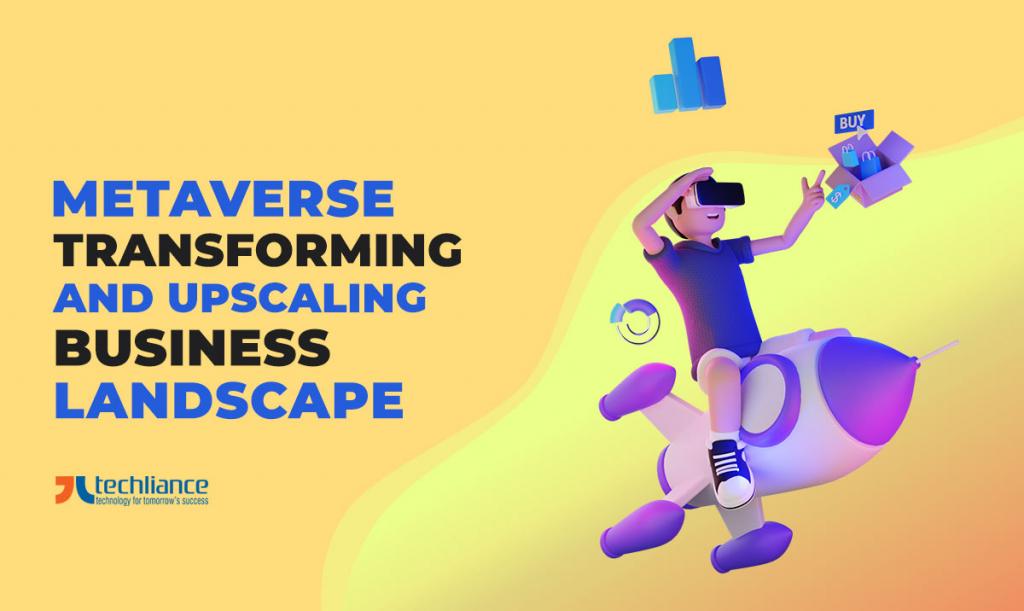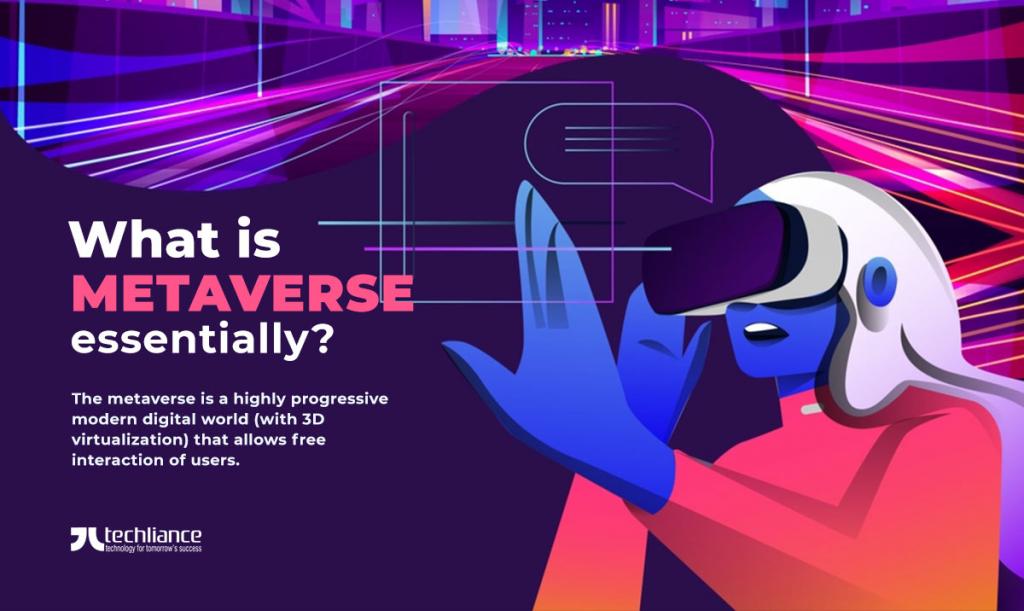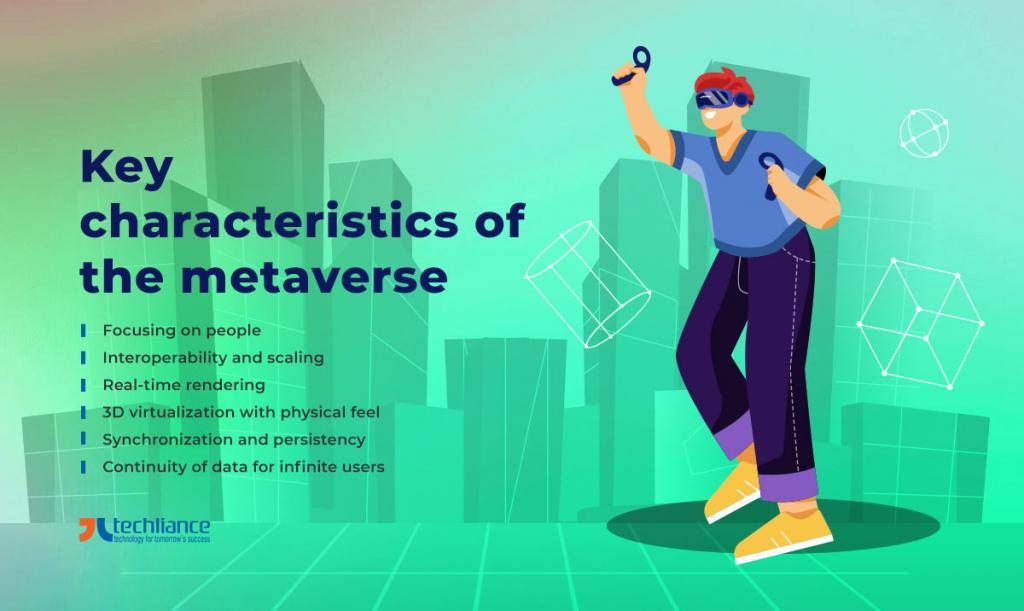This is 2024, and we’re on the brink of exciting things that will take us over in a few years. The concept of the metaverse is probably one of the most discussed topics in the world of technology. Essentially, the metaverse is disrupting the industry landscape by transforming businesses globally and in the United States.
It is something that we have not experienced before. In today’s world, a lot of businesses are already enhanced through AR and VR models; or are moving towards this. So, it does not seem like a mindboggling idea how metaverse can work.
Things are not that simple though. Over 20 years ago, we could not have imagined how this concept of metaverse could have taken place. Once, this idea looked right out from sci-fi movies or books.

What is metaverse, anyway?
The digital reality of metaverse combines social media, online gaming, augmented/virtual reality (AR/VR), and cryptocurrencies; so users can interact virtually. AR overlays visual elements, sound, and other input onto real-world settings. While VR is all about providing virtual and fictional realities. Therefore, the metaverse is a blend of both AR and VR, enabling users to think far out on various possibilities.
Metaverse gives out the feeling of multi-dimensional user interactions. All thanks to the intersection of so many innovative technologies in the concept. This divulgence is a junction for the brilliance of many things today, that can even facilitate future ideas.
Consider it a virtual-reality space that helps users interact within a computer-generated environment with each other. A metaverse can be reckoned as a network of 3D virtual worlds with a focus on social connection. So, it then further enables businesses to expand their growth and connect consumers to the right buy.
Think Avatar but instead of a blend into another “real” world, we’ll all be part of a bigger virtual association. This helps users and businesses grow together in wider social interactions. Ultimately, the Internet would become a single and universal world that is facilitated and augmented by reality headsets.

It’s only the beginning in the metaverse
In 2024, we are already far out in making this concept of metaverse turn into reality. There is a lot of progress so far in various areas. For example, ever-improving graphics processing units (GPUs), photorealistic 3D engines, faster content generation through volumetric video, and artificial intelligence (AI).
We have cloud computing services and 5G that make it a sounder blockchain infrastructure for the enablement of the metaverse. With time, our user interactions are greatly benefiting from AR/VR and BCI. It makes metaverse seem like a natural progression of technology.
In the future, the adoption of extended reality (XR) will further set the platform for the quick turn of events. By 2025, the VR and AR headsets will prevail worldwide and in the USA. So, AR/VR headsets will play a great role to provide a digital experience to users in many industries.
Do you remember the time when smartphones came about and completely became the new rage? Immersive technologies (AR, VR, and MR) will probably be the same way in a matter of a few years. Immersion will probably set up the base for the metaverse, together with other factors.
This is a starting point or the beginning of the new wave. Where you can have corporate chessboard moves, boardroom discussions, and even elevated investment activity. From video games, the metaverse is moving towards experiences like virtual shopping with Walmart, Nike, and Adidas.
Key characteristics of the metaverse
The biggest factor behind metaverse is the people. Irrespective of how it may look and feel, the end-users are the main actors or personas behind driving the concept. Some of the main takeaways from the characteristics of metaverse include the following.
- Focusing on people
- Interoperability and scaling
- Real-time rendering
- 3D virtualization with physical feel
- Synchronization and persistency
- Continuity of data for infinite users

The patronage of Big Tech for the metaverse
Tech giants like Facebook are significantly boosting the metaverse. Even the normal Facebook users see the new company name: Meta platforms, whenever they launch the app on their phones. Facebook now even owns Instagram and Whatsapp.
Are we all predicting a complete military takeover of the metaverse by Mark Zuckerberg? Well, no! But, it’s important to realize the direction the company is trying to take.
Back in October 2021, Facebook issued a press release about their rebranding and expansion towards metaverse. It disclosed how they are trying to bring XR technologies to the surface through wide interconnected virtual experiences.
This move towards metaverse will be a huge influence on how Facebook will eventually become. They intend to make Facebook a global virtual social interaction space for users. So, the time for us to have our virtual avatars seems very near.
We cannot even fathom to realize how the new interactions will be. For now, they seem promising, with big tech companies like Apple, Google, Amazon, Facebook, and Microsoft endorsing metaverse. Even, metaverse seems likely to push innovations like web 3.0 closer to reality. It will come out as a double force in greater and more enriching kinds of experiences for us all.
Already, Facebook is spending $50 million in global research and program partners to build metaverse more sensibly. Zuckerberg is endorsing AR glasses as the next gadgets, to work as wearables like smartwatches or digital health devices. Moreover, the company has announced plans to create 10,000 high-skilled jobs in the European Union (EU).
Is metaverse just a digital escape?
In today’s world, social media, and online games are just ways of breaking away from our real life. This may seem like a stark comment to many people. Especially, the ones who are earning through digital spaces, social networking platforms, and online communities.
However, let’s face it. You just do one click/tap and your mind travels away to another world. And that’s what the current metaverse significance is for now.
The users can have higher interactive and 3D social environments. For instance, consider headsets such as Meta Quest, and Sony PVSR. Also, the market is buzzing with rumors of the release of HMDs by Apple, Microsoft, and Google.
It can be a truly submersive experience where users will be part of virtual reality. And interactions will be more life-like than ever. Just take the example of video games. Here, users are already experiencing it to be more than a virtual space for burning their energy.
Some analysts expect Meta to obtain a major gaming franchise in 2022. This comes as no surprise as the gaming industry is witnessing major acquisitions. Microsoft has attained Activision Blizzard at $68.7 billion. Sony has purchased Bungie for $3.6 billion. Take-Two Interactive has got Zynga for $12.7 billion.
Meta Platforms Inc. has renamed Oculus Quest 2 headset to Meta Quest 2. Perhaps, it was among the leading selling products during the holiday shopping season of 2021. Previously called Facebook Inc., they have sold 5 million to around 10 million VR headsets before the start of 2022.
This means that users are welcoming the Meta rage and looking forward to a brand new XR experience. Still, the narrative has distinct lines between reality and digital spaces. Asking for Meta Platforms or any other possible iteration of Metaverse to completely take over is not an easy task.
Whatever the vision of metaverse Mark Zuckerberg or Meta Platforms have, they can only build the context gradually. It will take years for the entire Internet or digital landscape to be completely re-done in the way they’re planning. Web 3.0 is a more conflicting concept that talks about decentralization of the experience, control, and monetization of the Internet.
Metaverse is more about giving greater control to a particular few companies that dictate our online experiences. The conflict may eventually bring about the common ground with more liberation for end-users. Only time can tell what would happen.
How advanced can metaverse possibly be?
The biggest game-changers for metaverse will be the brain-computer interfaces (BCIs). They are also known as brain-machine interfaces (BMIs). These are crucial elements in XR technologies. Consider relying on screens and traditional control systems where BCIs aim to replace screens and physical hardware. Elon Musk’s neurotechnology company Neuralink aims to make implantable BMIs. It envisions these devices to enable speech-impaired people to get complete restoration of speaking and writing capabilities.
The same concept will perhaps see implementation in gaming and social technologies as well. In January 2021, Valve declared the intention of exploring BCIs in the Galea headsets of OpenBCI. The application is tremendous and not just spans to virtual reality but healthcare as well.
Valve has an extended partnership with MIT, Media Lab, and Tobii for this purpose. The company is raising funding for developing the “operating system of the mind”. This context of metaverse will witness the successful integration of technology into the human experience.
Although, many users are wary of getting chip implants in their brains. Nonetheless, for medically impaired people, this technology breakthrough can be massive. It will be a great starting point for the technology to evolve and be eventually embraced in different avenues.

Conclusion
Change is always inevitable. Technology, digitization, and the Internet are always a promise for more. Nobody can contain the power of social media and virtualization.
Cloud computing, AI/ML, 5G, VR/AR, blockchain, and cryptocurrencies as the indelible front for technology. Also, we all knew that something more grand is coming our way. Metaverse will redefine our way of thinking by bringing better social interactions.
The potential is to start by challenging how advanced XR technologies can become. Particularly, when when we combine them with other sets of modern technologies. What kind of interaction we’ll have with financial organizations through a metaverse?
How interesting can a virtual mall experience be where you can explore, test, and buy products on the fly? In short, metaverse seems like an eventuality where great possibilities exist. We will present more posts on the concept as it unveils.
Do you need a great app or product to help elevate your solution? Are you stuck with an idea that doesn’t seem to build up? We at Techliance help you connect the dots and build you something great. You are a click away from starting your journey to a great product.




